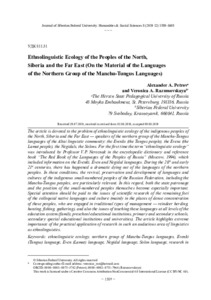Показать сокращенную информацию
Ethnolinguistic Ecology of the Peoples of the North, Siberia and the Far East (On the Material of the Languages of the Northern Group of the Manchu-Tungus Languages)
| Автор | Petrov, Alexander A. | en |
| Автор | Razumovskaya, Veronica A. | en |
| Автор | Петров, А. А. | ru_RU |
| Автор | Разумовская, В. А. | ru_RU |
| Дата внесения | 2019-08-30T05:55:56Z | |
| Дата, когда ресурс стал доступен | 2019-08-30T05:55:56Z | |
| Дата публикации | 2019-08 | |
| URI (для ссылок/цитирований) | https://elib.sfu-kras.ru/handle/2311/112628 | |
| Аннотация | The article is devoted to the problem of ethnolinguistic ecology of the indigenous peoples of the North, Siberia and the Far East — speakers of the northern group of the Manchu-Tungus languages of the Altai linguistic community: the Evenks (the Tungus people), the Evens (the Lamut people), the Negidals, the Solons. For the first time the term “ethnolinguistic ecology” was introduced by Professor V. P. Neroznak in the encyclopedic dictionary and reference book “The Red Book of the Languages of the Peoples of Russia” (Moscow, 1994), which included information on the Evenki, Even and Negidal languages. During the 20th and early 21st centuries, there has happened a dramatic dying out of the languages of the northern peoples. In these conditions, the revival, preservation and development of languages and cultures of the indigenous small-numbered peoples of the Russian Federation, including the Manchu-Tungus peoples, are particularly relevant. In this regard, both the state patronage and the position of the small-numbered peoples themselves become especially important. Special attention should be paid to the issues of scientific research of the remaining foci of the colloquial native languages and culture (mainly in the places of dense concentration of these peoples, who are engaged in traditional types of management — reindeer herding, hunting, fishing, gathering), and also the issues of teaching these languages at all levels of the education system (family, preschool educational institutions, primary and secondary schools, secondary special educational institutions and universities). The article highlights extreme importance of the practical application of research in such an audacious area of linguistics as ethnolinguistics | en |
| Аннотация | Исследуется проблема этнолингвоэкологии коренных малочисленных народов Севера, Сибири и Дальнего Востока — носителей языков северной группы тунгусо-маньчжурских языков алтайской языковой общности: эвенков (тунгусов), эвенов (ламутов), негидальцев, солонов. Впервые термин “этнолингвоэкология” был введен в научный оборот профессором В. П. Нерознаком в энциклопедическом словаре-справочнике “Красная книга языков народов России” (М., 1994), в котором были помещены сведения по эвенкийскому, эвенскому и негидальскому языкам. В течение XX — начала XXI века происходит активный процесс утраты языков северных народов. В этих условиях представляется особенно актуальным возрождение, сохранение и развитие языков и культур коренных малочисленных народов РФ, в том числе и тунгусо-маньчжурских. В этом случае важное значение приобретает как патронат со стороны государства, так и позиция самих малочисленных народов. Особое внимание следует уделять вопросам научного исследования сохранившихся очагов бытования разговорного родного языка и культуры (приоритетно в местах компактного проживания этих народов и ведения традиционных видов хозяйствования — оленеводства, охоты, рыболовства, собирательства), а также преподавания этих языков на всех уровнях системы образования и воспитания (семья, дошкольные образовательные учреждения, начальная и средняя школа, средние специальные учебные заведения и вузы). Констатируется чрезвычайная важность практического применения результатов исследований такого интересного направления языкознания, как этнолингвистика | ru_RU |
| Язык | en | en |
| Издатель | Сибирский федеральный университет. Siberian Federal University | en |
| Тема | ethnolinguistic ecology | en |
| Тема | northern group of Manchu-Tungus languages | en |
| Тема | Evenki (Tungus) language | en |
| Тема | Even (Lamut) language | en |
| Тема | Negidal language | en |
| Тема | Solon language | en |
| Тема | research in languages of the peoples of the North | en |
| Тема | Siberia and the Far East, studying of these languages | en |
| Тема | ethnolinguistics | en |
| Тема | этнолингвоэкология | ru_RU |
| Тема | северная группа тунгусо-маньчжурских языков | ru_RU |
| Тема | эвенкийский (тунгусский) язык | ru_RU |
| Тема | эвенский (ламутский) язык | ru_RU |
| Тема | негидальский язык | ru_RU |
| Тема | солонский язык | ru_RU |
| Тема | исследования и преподавание языков народов Севера | ru_RU |
| Тема | Сибири и Дальнего Востока | ru_RU |
| Тема | этнолингвистика | ru_RU |
| Название | Ethnolinguistic Ecology of the Peoples of the North, Siberia and the Far East (On the Material of the Languages of the Northern Group of the Manchu-Tungus Languages) | en |
| Альтернативное название | Этнолингвоэкология народов Севера, Сибири и Дальнего Востока (на материале языков северной группы тунгусо-маньчжурских языков) | ru_RU |
| Тип | Journal Article | en |
| Контакты автора | Petrov, Alexander A.: The Herzen State Pedagogical University of Russia 48 Moyka Embankment, St. Petersburg, 191186, Russia; ORCID: 0000–0003–0075–3742 | en |
| Контакты автора | Razumovskaya, Veronica A.: Siberian Federal University 79 Svobodny, Krasnoyarsk, 660041, Russia; ORCID: 0000–0002–0751–7964 | en |
| Контакты автора | Петров, А. А.: Российский государственный педагогический университет им. А. И. Герцена Россия, 191186, Санкт-Петербург, набережная реки Мойки, 48 | ru_RU |
| Контакты автора | Разумовская, В. А.: Сибирский федеральный университет Россия, 660041, Красноярск, пр. Свободный, 79 | ru_RU |
| Страницы | 1589-1608 | |
| DOI | 10.17516/1997–1370–0466 | |
| Журнал | Журнал Сибирского федерального университета. Гуманитарные науки. Journal of Siberian Federal University. Humanities & Social Sciences;2019 12 (8) | en |

